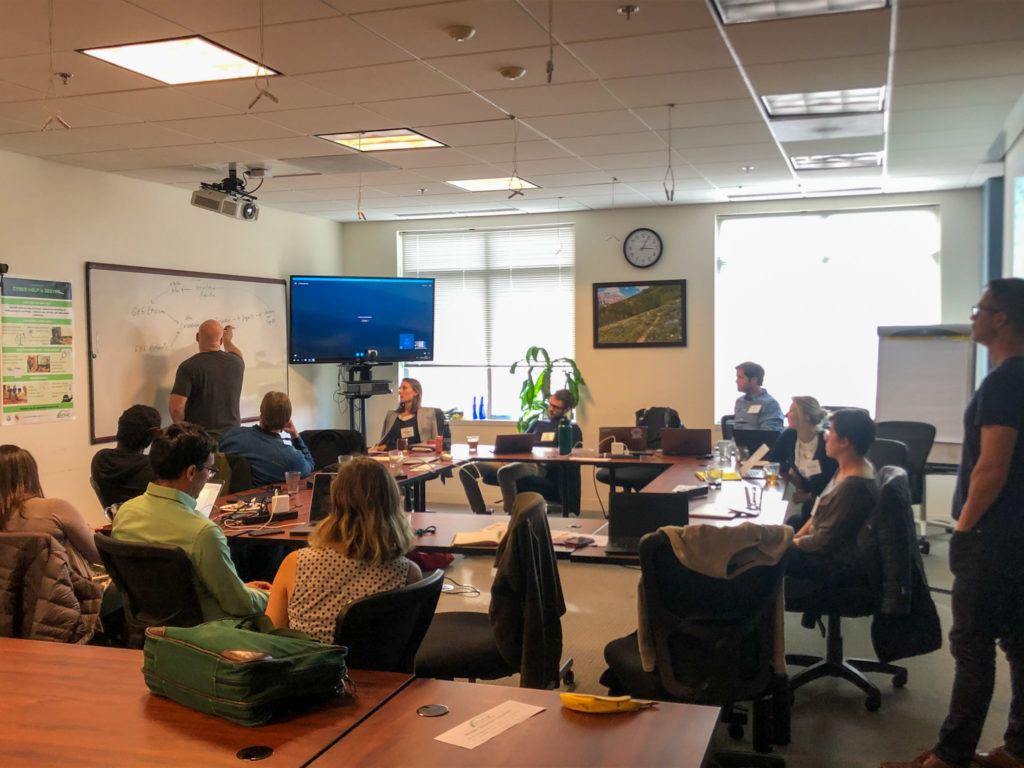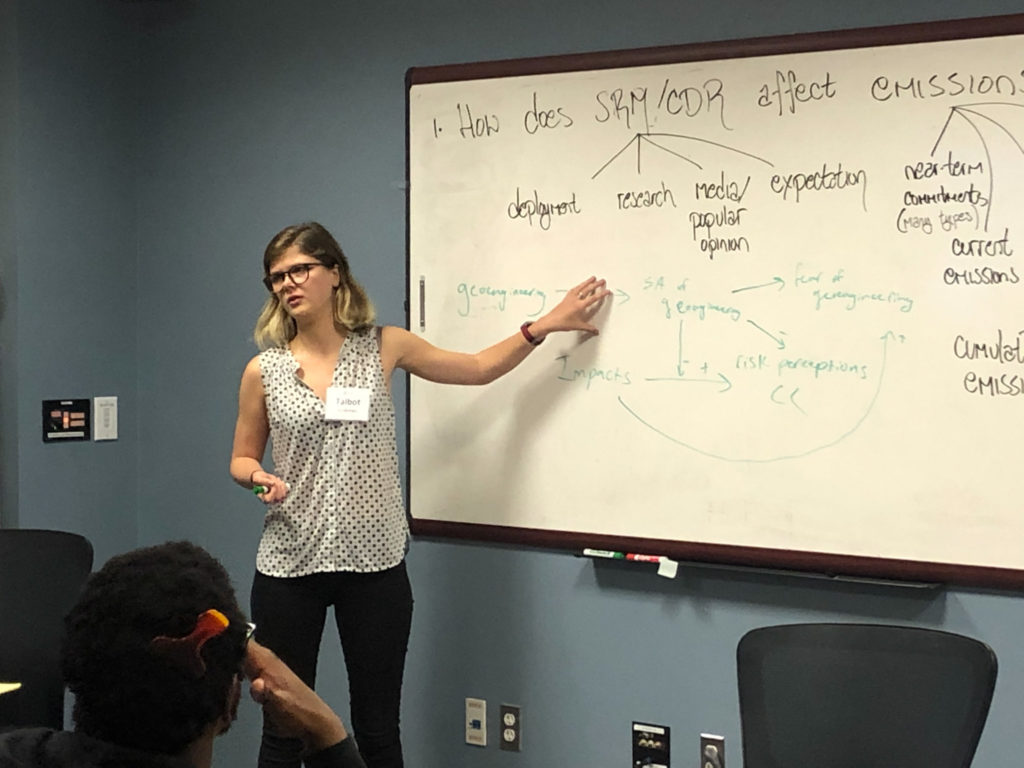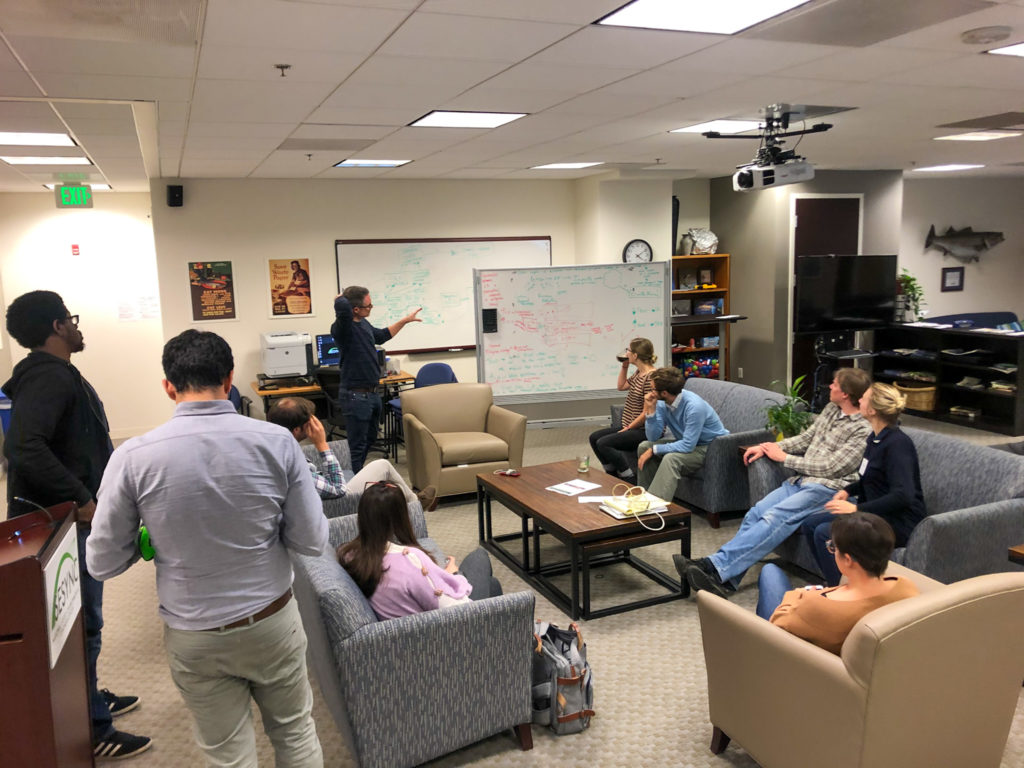FCEA has embarked on a two-year project, titled “New Scenarios and Models for Climate Engineering,” with the support of the National Socio-Environmental Synthesis Center (SESYNC). Led by FCEA’s Co-Executive Director, Simon Nicholson, and Chris Trisos of the University of Cape Town, the project will produce the first set of scenarios and models that integrate both the social and environmental aspects of climate engineering technologies and that, in addition, help policymakers understand potential interactions between climate engineering technologies and existing mitigation efforts. The result will be a new set of powerful tools to guide policy decisions around climate engineering technologies, as well as guidance for the inclusion of socio-environmental dynamics into climate scenarios and models more generally.
The project revolves around a series of four workshops held at SESYNC in Annapolis, Maryland. Each workshop will convene fifteen to twenty experts from around the world, including experts on solar geoengineering, carbon removal, climate modeling, integrated assessment modeling, public policy, climate politics, and scenarios generation.
 SESYNC brings together the science of the natural world with the science of human behavior and decision-making to find solutions to complex environmental problems. By supporting interdisciplinary science teams and researchers with diverse skills, data, and perspectives, SESYNC seeks to lead in-depth research and scholarship that will inform decisions and accelerate scientific discovery.
SESYNC brings together the science of the natural world with the science of human behavior and decision-making to find solutions to complex environmental problems. By supporting interdisciplinary science teams and researchers with diverse skills, data, and perspectives, SESYNC seeks to lead in-depth research and scholarship that will inform decisions and accelerate scientific discovery.
The first workshop focused on developing detailed, dynamic scenarios depicting possible futures in which climate engineering play an important role. With the help of three science fiction writers, Laura Pereira of City University of London led the group through a scenarios generation process adapted from the Manoa mash-up method. Over five days, participants developed three core scenarios to help understand how solar geoengineering and carbon removal might factor into the future, and what forces or dynamics in those scenarios might lead to better or worse outcomes.
This workshop’s core participants, in alphabetical order, were:
| Valentina Aquila | American University Assistant Professor of Environmental Science |
| Brian Beckage | University of Vermont Professor of Plant Biology & Computer Science |
| Sam Beckbessinger | Cape Town-based science fiction writer |
| Lauren Beukes | Cape Town-based science fiction writer |
| Holly Buck | University of California–Los Angeles Postdoctoral Fellow, Institute of the Environment and Sustainability |
| Colin Carlson | Georgetown University Postdoctoral Researcher, Department of Biology |
| Oliver Geden | German Institute for International and Security Affairs Head of Research Division |
| David Keller | GEOMAR, Helmholtz Center for Ocean Research Kiel Research Scientist |
| Katharine Mach | Stanford University Senior Research Scientist, Department of Earth System Science |
| Mohale Mashigo | Cape Town-based science fiction writer |
| Juan Moreno-Cruz | University of Waterloo Associate Professor and Canada Research Chair in Energy Transitions |
| David Morrow | American University Director of Research, Forum for Climate Engineering Assessment |
| Simon Nicholson | American University Assistant Professor of International Relations Executive Director, Forum for Climate Engineering Assessment |
| Laura Pereira | City University Lonson Postdoctoral Research, Department of Sociology |
| Chris Trisos | University of Cape Town Research Fellow, African Climate and Development Initiative |
| Daniele Visioni | Cornell University Postodoctoral Associate, Mechanical and Aerospace Engineering |
The organizers would also like to thank SESYNC’s Carrie Hritz for additional facilitation, as well as several drop-in participants, including Drew Jones, Shuchi Talati, and Michael Thompson.
Workshop participants are currently working on a range of outputs, including academic papers and science fiction stories distilling the scenarios generated and the lessons learned at the workshop.
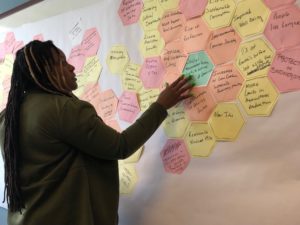
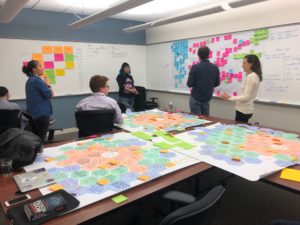
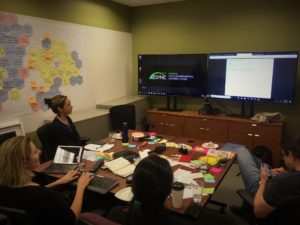
The second workshop focused on the characterization and first steps towards the modeling of three social dynamics: “moral hazard,” trust, and perceptions of risk. These social dynamcis emerged as particularly important across the three groups of scenarios developed at the first workshop. Over four days, participants mapped out conceptual models of the interplay between those three social dynamics and climate change, climate policy, geoengineering.
This workshop’s core participants, in alphabetical order, were:
| Talbot Andrews | Stony Brook University PhD Candidate, Political Science |
| Valentina Aquila | American University Assistant Professor of Environmental Science |
| Brian Beckage | University of Vermont Professor of Plant Biology & Computer Science |
| Mariia Belaia | Harvard University Postdoctoral Fellow, Harvard John A. Paulson School of Engineering and Applied Sciences |
| Maggie Clifford | American University PhD Candidate, School of Communications |
| Jay Fuhrman | University of Virginia PhD Candidate, Environmental Engineering |
| David Keller | GEOMAR, Helmholtz Center for Ocean Research Kiel Research Scientist |
| Michael Maniates | Yale-National University of Singapore Professor of Social Science |
| David Morrow | American University Director of Research, Forum for Climate Engineering Assessment |
| Simon Nicholson | American University Assistant Professor of International Relations Executive Director, Forum for Climate Engineering Assessment |
| Kaitlin Raimi | University of Michigan Assistant Professor of Public Policy |
| Olufemi Taiwo | Georgetown University Assistant Professor of Philosophy |
| Chris Trisos | University of Cape Town Research Fellow, African Climate and Development Initiative |
| Daniele Visioni | Cornell University Postodoctoral Associate, Mechanical and Aerospace Engineering |
The organizers would also like to thank several drop-in participants, including Sara Metcalf and Travis Franck.
